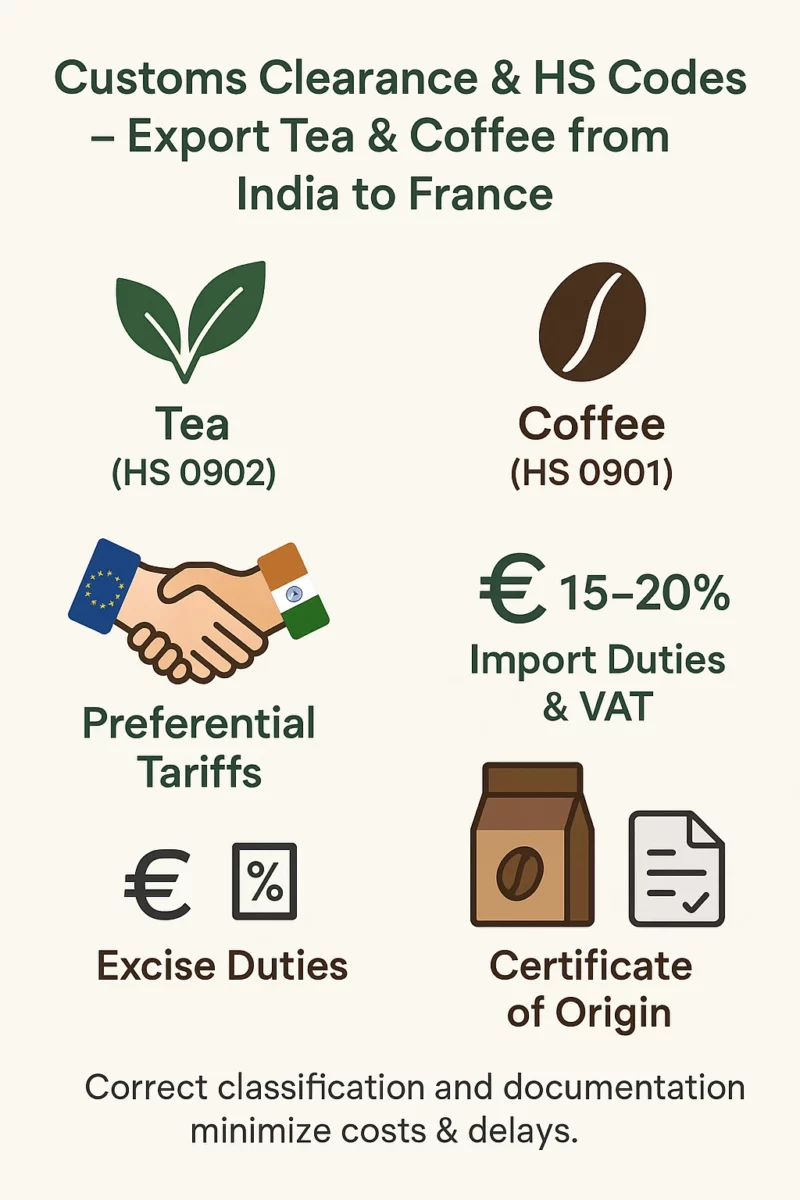India has a centuries-old reputation as a global hub for tea and coffee production. From the misty slopes of Darjeeling and Nilgiris to the coffee estates of Karnataka and Kerala, Indian farmers cultivate some of the most aromatic and flavorful beverages in the world. With its sophisticated café culture and preference for high-quality gourmet beverages, France has emerged as an attractive export destination, making it increasingly lucrative to Export Tea and Coffee from India to France.
For businesses planning to export tea and coffee from India to France, it is essential to understand trade potential, market entry strategies, documentation requirements, licensing, customs regulations, freight forwarding, and quality standards. This comprehensive guide will help Indian exporters tap into France’s growing beverage market with confidence.
Why Export Tea and Coffee from India to France
France has one of the largest coffee consumption rates in Europe and a steadily growing tea market. Unlike the UK, where black tea dominates, French consumers are increasingly turning to herbal infusions, green teas, and specialty blends. Coffee, on the other hand, has a deep cultural significance, with Parisian cafés and gourmet coffee shops being central to social life.
- Tea Exports To France: While tea consumption is lower compared to the UK or Russia, the French tea market has grown at 3–5% annually, especially in herbal, organic, and premium segments. Indian teas such as Assam (strong flavor), Darjeeling (delicate and aromatic), and Nilgiri (fragrant and smooth) are highly valued.
- Coffee Exports to France: France is the sixth-largest importer of coffee in the world. Indian coffee, particularly Arabica and Monsooned Malabar, appeals to French roasters and specialty cafés.
- India–France Trade Potential: The EU is India’s largest trading partner, and France has steadily increased imports of agricultural products. With tariffs reduced under preferential trade agreements, Indian exporters hold a comparative advantage.
- Export Value Data: India’s annual tea exports exceed 200 million kg, while coffee exports are around 300,000 tons, with Europe being a key destination. France consistently imports both tea and coffee, with annual imports valued in billions of euros.
This demand highlights significant export growth trends, with room for India to expand its share by positioning itself in the premium and sustainable segments.
Essential Documentation For Export Tea And Coffee from India to France
Documentation is the backbone of international trade. Errors or incomplete paperwork can lead to customs delays or shipment rejections. Exporters must prepare the following documents to export tea and coffee from India to France:
- Import Export Code (IEC) – A 10-digit code issued by DGFT, mandatory for all Indian exporters.
- Commercial Invoice – Contains details of buyer, seller, HS codes, quantity, unit price, total value, and incoterms.
- HS Code for tea: 0902
- HS Code for coffee: 0901
- HS Code for tea: 0902
- Packing List – Specifies package contents, dimensions, and weight.
- Bill of Lading (B/L) – Contract between exporter and shipping line for sea freight.
- Airway Bill (AWB) – Required for air freight, acts as proof of shipment.
- Certificate of Origin (CoO) – Confirms products are Indian-made; needed to avail tariff concessions.
- Phytosanitary Certificate – Issued by the Plant Quarantine Department in India, ensuring goods are pest-free and comply with EU health standards.
- Health Certificate – Required for food exports, proving compliance with EU hygiene rules.
- Export License (if applicable) – Some products may require special permission, though tea and coffee are generally unrestricted.
These documents form the foundation of customs clearance at both Indian and French ports.
Licensing And Registration Requirements for Export Tea and Coffee from India to France
Before beginning exports, Indian businesses must complete certain registrations:
- Tea Board of India: All tea exporters must obtain registration-cum-membership certificates. This board also monitors quality and assists in global promotion.
- Coffee Board of India: Coffee exporters must register with the Coffee Board to access quality certifications, export clearances, and market insights. This is an essential part for tea and coffee export from India to France.
- APEDA (Agricultural and Processed Food Products Export Development Authority): Registration with APEDA is compulsory for agricultural exports, including tea and coffee.
This process ensures exporters meet Indian regulatory standards before entering the EU market.
Customs Clearance And HS Codes
France, as part of the EU, enforces strict import rules under the Union Customs Code (UCC).
- HS Codes: Products must be classified correctly to avoid penalties.
- Tea – 0902
- Coffee – 0901
- Tea – 0902
- Preferential Tariffs: India–EU agreements offer reduced tariffs if exporters provide a valid Certificate of Origin.
- Import Duties And VAT: EU countries levy VAT (typically 15–20%) on tea and coffee imports. Duties vary depending on product type, but organic and fair-trade certified products may qualify for tariff relief.
- Excise Duties: May apply to certain flavored or processed coffee products.
Proper customs documentation and tariff classification help exporters minimize costs and delays.

Freight Forwarding, Logistics, And Insurance
Logistics arrangements play a crucial role in the timely delivery of goods. Exporters should evaluate:
- Air Freight: Fastest mode, ideal for high-value specialty consignments. Governed by the Airway Bill, which ensures shipment traceability.
- Sea Freight: Best for large volumes at lower costs. Requires a Bill of Lading, which serves as proof of ownership.
- Multimodal Transport: A combination of road, rail, sea, and air for cost optimization.
- Freight Forwarding: Professional freight forwarders handle route selection, packaging, consolidation, and customs procedures.
- Freight Insurance: Provides financial protection against accidents, theft, or natural disasters during transit.
India already has efficient India-to-USA courier models, and similar systems can be replicated in the India–France trade route for better efficiency.
Quality Control And Compliance With EU Standards
Quality is a non-negotiable requirement for entry into the French market. Exporters must adopt:
- Food Safety Certifications: HACCP, ISO 22000, and compliance with EU food laws.
- Organic and Fair-Trade Certifications: Increasingly demanded by French consumers.
- Geographical Indication (GI Tags): Products like Darjeeling Tea and Monsooned Malabar Coffee enjoy global recognition and higher market value.
- Sustainable Packaging: Eco-friendly materials align with EU environmental norms.
- Regular Quality Checks: Moisture content, pesticide residue, and flavor profile must meet EU import standards.
These practices not only ensure quality control but also enhance brand reputation.
Product Differentiation For Success In France
In a market crowded with suppliers from Africa, South America, and Asia, Indian exporters must stand out. Strategies include:
- Offering unique blends and flavors (e.g., spiced teas, specialty roasts).
- Promoting organic and health-based products (herbal teas, antioxidant-rich green teas).
- Using storytelling and heritage marketing, emphasizing India’s rich history in tea and coffee cultivation.
- Targeting premium channels such as gourmet stores, high-end cafés, and online specialty platforms.
Such product differentiation builds customer loyalty and ensures repeat demand.
Export Growth Trends And Opportunities
- Tea Growth: French imports of green and specialty teas have grown by over 20% in the past five years.
- Coffee Boom: Specialty coffee chains and artisanal roasters in France are sourcing unique beans from countries like India.
- E-Commerce Surge: Online sales of tea and coffee in France are rising rapidly, providing direct-to-consumer opportunities.
- Sustainability Focus: Fair-trade, eco-friendly, and socially responsible products enjoy higher acceptance and better pricing.
These trends provide significant trade potential for Indian exporters looking to scale globally.
Conclusion
Exporting tea and coffee from India to France is more than just shipping products across borders; it’s about aligning with international standards, understanding consumer preferences, and creating a differentiated brand presence. With robust export documentation (IEC, APEDA, Phytosanitary Certificate, Certificate of Origin, Packing List, Bill of Lading, Airway Bill), strong logistics arrangements, and compliance with EU quality requirements, Indian exporters can fully leverage their comparative advantage.
France offers a market that values authenticity, heritage, and sustainability. By focusing on quality control, product differentiation, and strategic logistics, Indian exporters can tap into the high-value tea and coffee sector in France and build long-term trade relationships
FAQs
France has a thriving café culture and strong demand for gourmet beverages. With growing interest in premium teas and specialty coffee, Indian producers have an excellent opportunity to tap into this market.
Key documents include a commercial invoice, packing list, bill of lading/airway bill, certificate of origin, phytosanitary certificate, and FSSAI/European food safety compliance certificates.
Yes. Exporters must obtain an Importer-Exporter Code (IEC) from DGFT. Additionally, FSSAI registration and compliance with EU food safety regulations are mandatory.
Exporters must comply with European Union customs rules, including product labeling, quality certifications, and adherence to EU tariff and non-tariff requirements.
Maintaining international quality standards, proper packaging, and adherence to certifications such as ISO, HACCP, and organic labeling (if applicable) are crucial to succeed in France.






